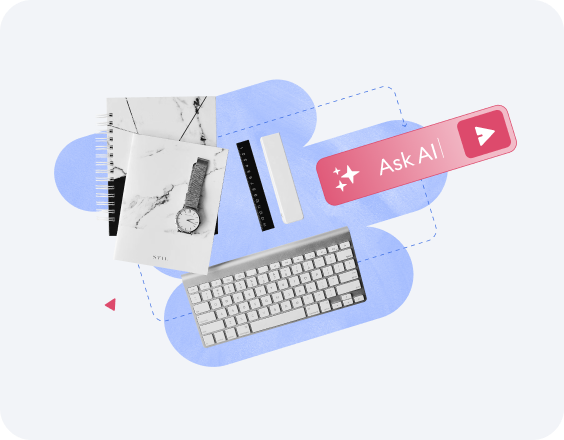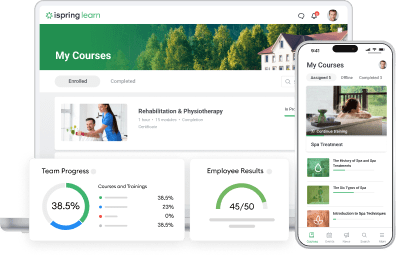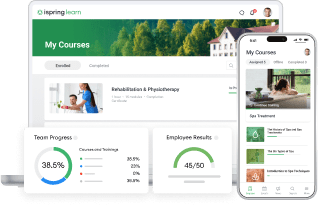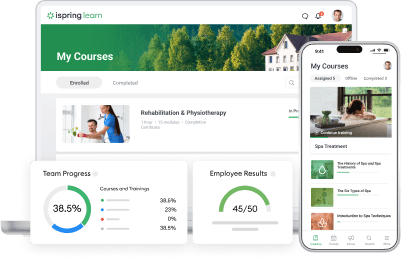Better, Cheaper, Quicker: How AI is Shaping Corporate Training

Artificial intelligence (AI) technology has disrupted nearly every industry since its mass-scale introduction at the end of 2022 — and corporate training is no exception. To stay ahead of the curve and remain competitive, businesses should recognize and understand the current role of AI in training programs and how they can make the most of it.
In this article, we’ll explain how AI is reshaping corporate learning and the benefits it can bring to organizations of all sizes in the business sector.
The Role of AI in Employee Training: An Overview
Over the past few decades, online learning platforms have evolved to become complex software with multiple features, making them able to handle a wide array of tasks while supporting collaborative learning environments.
The introduction of AI-driven features that began in the late 2010s helped make LMSs for workplace training more effective. But it was the rollout of ChatGPT and similar NLP (Natural Language Processing) chatbots that became the real transformative event for the eLearning industry and corporate training in particular, setting new market trends in employee development.
While the early adopters of AI in workplace training were just testing the waters, modern AI solutions for corporate training leverage the full power of AI to supercharge nearly every feature and help companies remain competitive by reaching their business goals faster and better. An AI platform can help streamline repetitive tasks, such as enrollments, scheduling, and payroll, as well as supercharging more complex processes like analyzing data and gleaning actionable insights. Moreover, generative AI technology now powers LMS authoring tools, facilitating content creation and course building.
Soon, AI-powered LMSs are bound to become the new standard in employee training. Here are the four main reasons to embrace this trend and implement AI training tools into the L&D process in your organization.

Why Use AI in Corporate L&D?
Here are the four main reasons to implement AI in your learning and development strategy.
- Increased productivity. A single employee can only do so much, and the output of a team of employees is only as large as a combination of each of the team member’s outputs. But people have physical limitations. With the help of AI training solutions, professionals can overcome these limitations and do more in less time, increasing productivity through smarter machine learning algorithms.
- Better personalization. Traditional training is often generic, which results in lower employee engagement, weak knowledge retention, lower course completion rates, and poorer training outcomes overall. Personalized learning, which tailors content to individual learning preferences, is more effective but time-consuming to create manually. AI solves this by quickly analyzing skill gaps, recommending courses, and designing customized learning paths within minutes.
- Access to valuable insights. Relevant data is essential for many processes. Collecting this data and analyzing it used to be time-consuming and tedious, but AI has made it much quicker and more convenient. With the reporting and analytics tools that are built into modern AI training platforms, training managers can get detailed information on all kinds of aspects of learners’ performance, such as completion and engagement rates, skill gaps, and more.
- Reduced costs. Workplace training is not an inexpensive venture. Fortunately, the best modern LMSs for small businesses now offer built-in AI features that make quality training more accessible by allowing a reduction in costs. Thanks to improved productivity and more effective training programs powered by AI, businesses of all sizes can realize maximum returns in employee training while automating routine tasks.
How AI Is Already Enhancing Corporate Training
Here are the key practical applications of AI in employee training and development as of this writing.
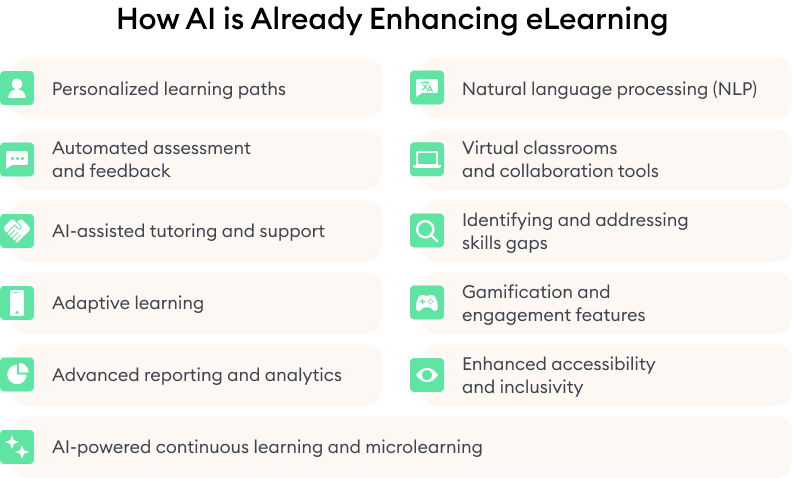
Personalized learning paths
In the battle between personalized vs. one-size-fits-all content, the former always wins. That’s why the ability to build personalized learning paths quickly and enable adaptive learning is one of the biggest benefits of leveraging artificial intelligence technology for training programs.
Now, AI algorithms analyze data that includes each learner’s performance, learning styles, proficiency levels, and preferences and then leverage predictive analytics to adjust the program’s parameters, making it more relevant and leading to better learning outcomes overall. This critical tool has revolutionized how we approach corporate education.
AI-generated training materials
Modern content creation tools that are present in an AI-based LMS for corporate training make content creation faster and cheaper, taking the bulk of the workload off the L&D program developer’s shoulders.
With generative AI features integrated into authoring software like iSpring Suite and other tools, educators can outline course structure, create copy and videos, transform text into speech, create subtitles in different languages, and more — in a matter of minutes and seconds instead of hours and days.
Assessment and feedback automation
Feedback and task assessment are essential for any training process. But creating these tasks and providing feedback can be time-consuming — even with a powerful LMS.
AI training solutions can generate quizzes and tests in a matter of minutes and automate feedback. For example, in iSpring Learn, it only takes a few mouse clicks to generate a quiz or a test. This not only frees up time for trainers but also ensures that learners get assessment results and instant feedback in real time and can draw conclusions and act immediately.
Streamlining administrative routines
Routine tasks are usually tedious, plus they consume a great deal of time that could otherwise be better spent. AI helps automate these and similar tasks by optimizing scheduling and sending out automatic reminders, for instance. This allows trainers and HR departments to focus on seeing the bigger picture and improving their programs and overall L&D strategy. For over a year, these automation features have been proving their worth in corporate settings.
AI-assisted tutoring and support
When studying at their own pace online, questions might spring up about specific aspects of a learning program. Human experts can’t be accessible 24/7, but virtual assistants can step in at any time, providing guidance and support and assisting employees in navigating their training.
Thanks to AI tutoring powered by NLP and machine learning algorithms, companies can deliver more personalized, adaptive, and engaging learning experiences at scale, emulating one-on-one tutoring sessions at a fraction of the cost.
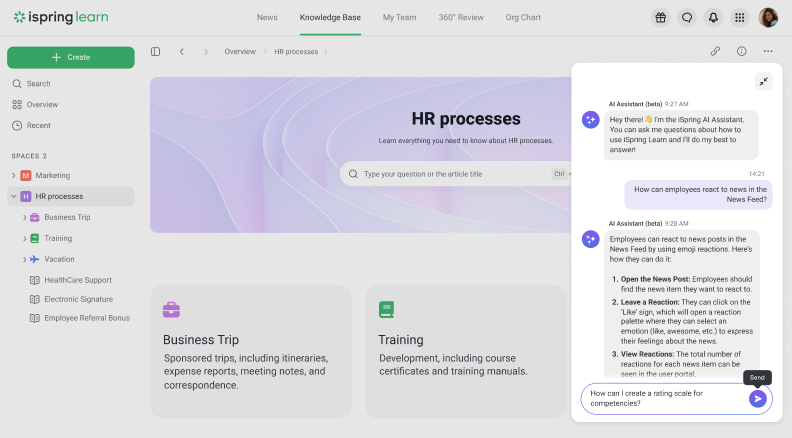
An example of AI Assistant in the iSpring Learn LMS
Detailed reporting and analytics
Data-driven insights are essential for measuring employee performance and evaluating the effectiveness of training courses. Here again, crunching the numbers is difficult and takes loads of time.
AI helps optimize this part of the training process as well. Detailed reports provided by AI-powered LMSs include information on such crucial aspects as completion rates, employee engagement, and knowledge retention. AI can also conduct skills assessments, analyze data, draw conclusions, and suggest upgrades, helping companies deliver a better training experience and improve employee retention.
Identifying skills gaps
Effective learning and development training is impossible without understanding what skills the workforce is already equipped with and identifying gaps that need to be addressed. Before corporate AI training, managers used to conduct a skills gap analysis manually. Now, technology can speed up the process.
Modern AI tools can analyze performance data within teams and entire departments, quickly pinpoint skills gaps, and identify which new skills employees need to acquire. Plus they can leverage AI for skills mapping, a process that involves identifying the skills required for various roles in the company and matching them with the current skills of employees.
Challenges of AI Implementation in Workplace Training
AI is a critical tool for enhancing training programs — but only when you’re aware of these common pitfalls.

Learning experiences that are not personalized
AI can make corporate learning more personalized, but not using it adequately can also result in less personalized learning experiences. When trainers offer employees training programs and modules without using advanced AI features, such as analytics, they end up delivering mediocre training that isn’t tailored to address the needs of their target audience.
Generic and unengaging course materials
While generative AI training tools are great for facilitating the content creation process, they’re entirely insufficient to gain only a superficial understanding of how to use AI to complete training modules. Without proper input data and careful expert review, AI-generated training content is likely to be somewhat generic, resulting in low employee engagement and poor learning outcomes.
Ineffective program delivery
Even the most wonderful training program won’t work without effective delivery. An LMS can make or break an entire course or even strategy, so it’s essential to choose from among the best AI training solutions. iSpring Learn is a robust LMS that helps businesses make the most of AI-powered features while ensuring top performance in other aspects, such as user-friendliness, reliability, convenience, and more.
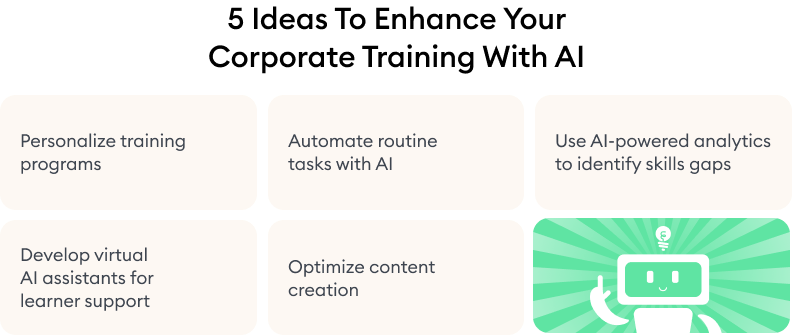
Moving Forward: The Future of AI in Corporate L&D
As the corporate training field continues to evolve, learning and development professionals will probably rely increasingly on AI technology. The algorithms will also likely become smarter, quicker, and more efficient. This will bring more benefits to those companies that adopt the technology while shaping future market trends in workplace learning.
Organizations will need to ensure they teach AI skills to their workforce to enable them to harness the power of artificial intelligence and put it to proper use. It will also be essential to integrate AI tools with LMS platforms currently in use or to choose AI-powered solutions like iSpring Learn to stay ahead of the competition.


